
Jehmlich Orgelbau Dresden is a privately owned organ building and restoration company in Dresden, Germany.

Jehmlich Orgelbau Dresden is a privately owned organ building and restoration company in Dresden, Germany.
The company was founded in 1808 in Cämmerswalde by three brothers, Gotthelf Friedrich, Johann Gotthold und Carl Gottlieb Jehmlich. The first organ was built in 1818. [1] In 1826 the company was moved to Dresden. It was led from 1862 to 1889 by Carl Eduard Jehmlich, then by the brothers Emil and Bruno Jehmlich, after 1938 by Otto and Rudolf Jehmlich until 1972. In 1972 the company was nationalized as VEB Jehmlich Orgelbau. Because of the specific expertise Horst Jehmlich became the director and family control was maintained. After the German reunification the company was reprivatized in 1990. In 2006 Ralf Jehmlich joined the company's leadership representing the sixth generation. [1]
In 2000, Jehmlich joined with Meissen to build the first porcelain organ. [2]
By 2014 Jehmlich had built 1161 organs. [2]
A partial list of organs built by Jehmlich Orgelbau can be found on the corresponding German website Jehmlich Orgelbau.
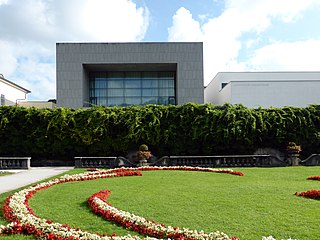
Mozarteum University Salzburg is one of three affiliated but separate entities under the “Mozarteum” moniker in Salzburg municipality; the International Mozarteum Foundation and the Mozarteum Orchestra Salzburg are the other two. It specializes in music, the dramatic arts, and to a lesser degree graphic arts. Like its affiliates it was established in honour of Salzburg-born musician Wolfgang Amadeus Mozart.

The St. Nikolai-Kirche, is the oldest church in Berlin, the capital of Germany. The church is located in the eastern part of central Berlin, the borough of Mitte. The area around the church, bounded by Spandauer Straße, Rathausstraße, the River Spree and Mühlendamm, is known as the Nikolaiviertel 'Nicholas quarter', and is an area of restored medieval buildings. The church was built between 1220 and 1230, and is thus, along with the Church of Our Lady at Alexanderplatz not far away, the oldest church in Berlin.
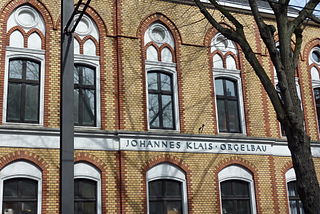
Orgelbau Klais is a German firm that designs, builds and restores pipe organs. It is a family run company, founded in 1882 by Johannes Klais senior and is now run by his great-grandson Philipp Klais. The firm is based in Bonn, Germany, and has completed many large-scale building and restoration projects around the globe in more than a century of organ building.

The Dohány Street Synagogue, also known as the Great Synagogue or Tabakgasse Synagogue, is a historical building in Erzsébetváros, the 7th district of Budapest, Hungary. It is the largest synagogue in Europe, seating 3,000 people and is a centre of Neolog Judaism.

Rieger Orgelbau is an Austrian firm of organ builders, known generally as Rieger. The firm was founded by Franz Rieger. From 1873 it was known as Rieger & Söhne, and from 1879 as Gebrüder Rieger, after his sons took over. At the end of World War II, the firm was nationalised by the Czech government and merged with another workshop as Rieger-Kloss. The Rieger tradition was also continued by the owners and workers of the original firm, who moved to Austria and founded a new workshop as "Rieger Orgelbau".
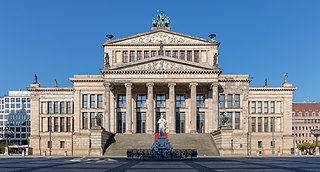
The Konzerthaus Berlin is a concert hall in Berlin, the home of the Konzerthausorchester Berlin. Situated on the Gendarmenmarkt square in the central Mitte district of the city, it was originally built as a theater. It initially operated from 1818 to 1821 under the name of the Schauspielhaus Berlin, then as the Theater am Gendarmenmarkt and Komödie. It became a concert hall after the Second World War, and its name changed to its present one in 1994.

The Paulinum is a university building of University of Leipzig, whose construction began in 2007. Today's Paulinum stands at the site of the old university church, the Paulinerkirche, which was destroyed in 1968 during the communist regime of East Germany.
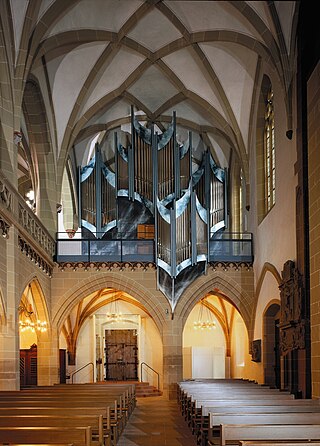
Orgelbau Vleugels is a pipe organ company producing organs in modern design and restoring historic instruments. The workshop is located in Hardheim, Germany. The owner is master pipe organ builder Hans-Georg Vleugels. The company has a history spanning over 150 years.

Johann Friedrich Schulze was a German organ builder, from a family of organ builders. The company built major organs in Northern Germany and England.

Stovner Church is a church center in Oslo, Norway.

The Kulturpalast Dresden is a modernist building built by Wolfgang Hänsch during the era of the German Democratic Republic. It was the largest multi-purpose hall in Dresden when it opened in 1969, and was used for concerts, dances, conferences and other events. The building underwent several years of reconstruction beginning in 2012 and opened with a new concert hall in April 2017.
Orgelbau Pieringer is an Austrian organ building company based in the city of Haag in Lower Austria. The founder and owner of the company is the Haag organ builder Johann Pieringer. Orgelbau Pieringer is a reputable organ workshop active for 25 years throughout Austria, Germany and Croatia, as well as a member of International Society of Organbuilders.

The Kongreßhalle Leipzig is an event building with several halls on Pfaffendorfer Straße in Leipzig directly next to the entrance to the Leipzig Zoo. Inaugurated in 1900 as the zoo's social hall, the building served as one of Leipzig's most important event venues for more than eight decades. After a long period of vacancy, it was extensively renovated and converted between 2001 and 2015.
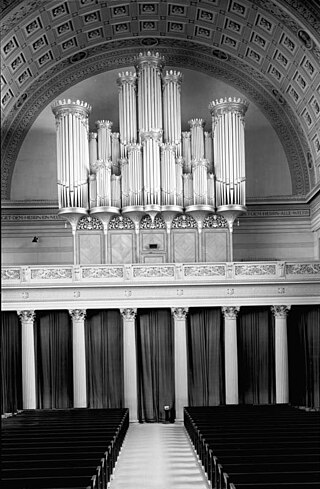
Gottlieb Heise was a German organ builder. In 1894, the renowned Alexander Schuke Potsdam Orgelbau company emerged from his Potsdam workshop.
Wolfgang Nußbücker is a German organ builder, cantor and founder of the organ building workshop "Mecklenburger Orgelbau" operating in Plau am See.
Carl Alexander Schuke was a German organ builder and from 1894 to 1933 owner and manager of the Alexander Schuke Potsdam Orgelbau. The company still exists today.
Hans-Joachim Schuke was a German organ builder. He was the son of the organ builder Alexander Schuke and ran his father's company, the "Alexander Schuke Orgelbauanstalt Potsdam", today the Alexander Schuke Potsdam Orgelbau company, weiter.

Karl Ludwig Alexander Schuke was a German organ builder. The son of the organ builder Alexander Schuke, he continued, together with his brother Hans-Joachim Schuke, to run their father's company in Potsdam until 1953, when he founded another organ building company, the Karl Schuke Berliner Orgelbauwerkstatt in West Berlin. They have built organs internationally in Korea, Australia and the U.S.